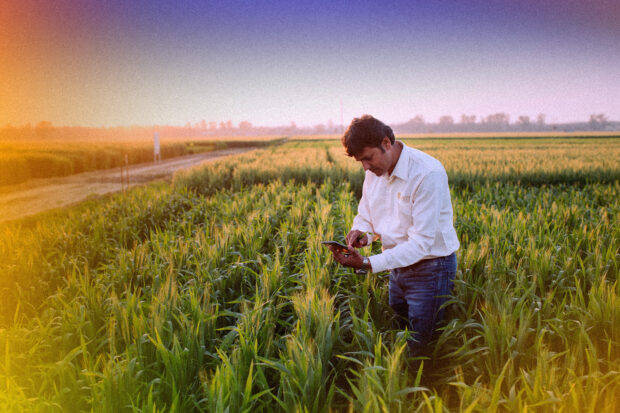In early March, we focused our monthly Digital Donors Exchange (DDX) session on unlocking data for climate action. Following our involvement at COP 28 and the recent launch of our Climate Data Joint Learning Network (Climate Data JLN), we convened our network of donor organizations to explore this critical topic and how the ecosystem of actors working in digital public infrastructure (DPI) can help drive progress. This discussion built on the insights from the Climate Data JLN roundtable held in February 2024.
In the hour-long session, our speakers delved into the challenges of unlocking climate-relevant data, as well as opportunities to overcome them. Alongside the Climate Data JLN lead, Chrissy Martin Meier, the session featured two kick-off speakers:
- Prasanna Lal Das, who discussed how the Indian state of Kerala is forming new data policies and building staff capacity to better harness data for climate resilience.
- Agustina Randazzo from Red de Innovacion Local in Argentina who presented its work on equipping governments with the tools and capabilities to overcome massive public challenges like climate change, in cities across Latin America.
Here’s what we learned:
Data can be a critical asset for climate action – especially for governments. But challenges to access, exchange, and usage remain.
The session focused primarily on frontline governments, who need data to improve the resiliency of communities that are struggling to adapt to the impacts of climate change. Climate data, when relevant, accessible, and used by decision makers, can support people as they seek to access drinkable water, prepare for disaster, maintain income during extreme weather events, or plan for managed retreat of geographic locations under threat from coastal erosion.
Yet, as our speakers emphasized, very few sub-national (state, city, provincial) governments currently leverage data effectively to drive climate action and improve the resiliency of affected people and communities. Even for relatively motivated and well-resourced governments with some climate data initiatives in place, we have not yet seen this data translated into action. This is due to a variety of factors, including challenges such as:
- Government staff capacity: It is challenging for even well-resourced governments to hire and retain the right people for climate data projects, which require multiple types of technical knowledge (information technology + environmental data).
- Lack of awareness: Sub-national governments are often unaware that data is available, even when it’s free.
- Lack of localized data: External actors such as satellite providers often collect data at a macro level; collecting hyper-local data historically requires human effort to, for example, collect water samples, which is often not scalable.
- Gaps in digital infrastructure: Governments are unable to share data with people or to leverage infrastructure outside of the government without proper dashboards, APIs, or other interoperability mechanisms and protocols.
- Insufficient data governance policies and processes: Open data programs don’t work without a data-sharing policy that allows for – or even mandates – government agencies to share data with each other and with the public. This is exacerbated when federal data-sharing policies and initiatives are not aligned with sub-national policies and initiatives.
Despite these challenges, there are opportunities to enable safe, inclusive data exchange for climate action.
Fortunately, as our participants noted, efforts to expand safe, inclusive, and open DPI are providing new opportunities to change this dynamic.
For example, the data exchange ‘layer’ of DPI improves governments’ capacity to share data between different government departments and with external actors. In addition, linking to digital ID and payment systems (two additional DPI layers) can help ensure welfare payments are delivered before or immediately after a climate-related extreme weather event.
To enable accessible, climate-relevant data, we must further explore – and build upon – these opportunities through components such as:
- Data governance policies that define what data can be made public and under what circumstances.
- Knowledge networks, which can build understanding of new models, such as data spaces, refine understanding of what works, and then help to overcome skepticism so that these can be deployed in specific contexts. Knowledge networks can also work with governments to change mindsets from a focus on improving internal processes to solving real problems for people.
- New models for data-sharing and governance that leverage emerging technology, such as data trusts, data spaces, and peer-to-peer networks enabled by decentralized protocols.
- Simple data tools and capacity strengthening efforts delivered in agile ways, recognizing that government staff are very busy. In other words, initiatives need to adapt to the reality that not all staff are or will become climate experts, and that they are unlikely to use a tool that does not make their job easier or more efficient.
- Borrowing expertise from outside of government, such as academia and business, to bridge capacity gaps within government. This can happen through fellowship programs; updating HR policies to allow for short-term, high-cost talent; and creating special programs such as labs within government with different policies and cultures.
- Peer learning networks, as it is much more effective for cities to hear from their peers on how they have overcome challenges and key success factors.
- Building shared infrastructure and resources that can be used by governments, CSOs, SMEs to ensure access to resources such as computing power.
- Improvements in data governance, including laws, policies, and institutions with the mandate to safeguard DPI and to connect the use of data to real challenges faced by people and communities.
Innovations in data-sharing bridge existing sectoral and organizational silos.
While the session’s speakers focused primarily on sub-national governments, participants highlighted how the same opportunities and challenges are relevant in efforts outside of city government. For example, there are efforts underway to improve data-sharing and governance across borders, as well as emerging efforts to share data between health and climate data management systems to improve early warning systems, nutrition, and food security.
By leveraging these opportunities, we can enable a data-sharing ecosystem that unlocks critical climate-relevant data, while providing local and national governments and other relevant actors – from data aggregators to development organizations – with the information needed for climate adaptation, mitigation, and response.
If you’d like to learn more about our efforts to advance data-sharing for climate action, take a look at our Climate Data Joint Learning Network.





